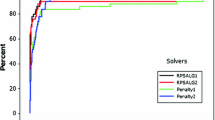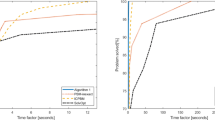Abstract
The so called dual parametrization method for quadratic semi-infinite programming (SIP) problems is developed recently for quadratic SIP problems with a single infinite constraint. A dual parametrization algorithm is also proposed for numerical solution of such problems. In this paper, we consider quadratic SIP problems with positive definite objective and multiple linear infinite constraints. All the infinite constraints are supposed to be continuously dependent on their index variable on a compact set which is defined by a number equality and inequalities. We prove that in the multiple infinite constraint case, the minimu parametrization number, just as in the single infinite constraint case, is less or equal to the dimension of the SIP problem. Furthermore, we propose an adaptive dual parametrization algorithm with convergence result. Compared with the previous dual parametrization algorithm, the adaptive algorithm solves subproblems with much smaller number of constraints. The efficiency of the new algorithm is shown by solving a number of numerical examples.
Similar content being viewed by others
References
Fiacco, A.V. and Ishizuka, Y. (1990), Suggested Research Topics in Sensitivity and Stability Analysis for Semi-infinite Programming, Annals Oper. Res. 27, 65–76.
Goberna M.A. and M.A. Lopez (1998), Linear Semi-infinite Optimization, John Wiley & Sons, Chichester.
Gustafson S.-A. and Kortanek, K.O. (1983), Semi-infinite Programming and Applications, in Bachen, A., et al. (eds.), Mathematical Programming: the State of the Art, Springer, Berlin, pp. 138–157.
Hettich, R. (1983), A review of Numerical Methods for Semi-infinite Optimization, in Fiacco, A.V. and Kortanek, K.O. (eds.), Semi-infinite Programming and Applications, Springer, Berlin, pp. 158–178.
Hettich R. and Kortanek, K.O. (1993), Semi-infinite Programming: Theory, Method, and Applications, SIAM Review 35, 380–429.
Liu, Y. Teo, K.L. and Ito, S. (1999), A Dual Parameterization Approach to Linear-quadratic Semi-infinite Programming Problems, Optimization Methods and Software, 10, 471–491.
Ito, S. Liu Y. and Teo, K.L. A Dual Parametrization Method for Convex Semi-infinite Programming, Annals of Operations Research, to appear.
Liu Y., Teo, K.L. and Ito, S. (1999), A Dual Parametrization Approach to Linear-Quadratic Semi-infinite Programming Problems, Optimization Methods and Software 10, 471–491.
Liu Y., Teo, K.L. and Ito, S. Global Optimization in Linear-Quadratic Semi-infinite Programming, Computing, to appear.
Luenberger, D.G. (1969), Optimization by Vector Space Method, John Wiley & Sons Inc., New York, London, Sydney, Toronto.
Mangasarian O.L. and Ponstein, J. (1965), Minmax and Duality in Nonlinear Programming, Journal of Mathematical Analysis and Applications 11, 504–518.
Rockafellar, R.T. (1970), Convex Analysis, Princeton Mathematical Series 28, Princeton University Press, Princeton, NJ.
Teo, K.L. Rehbock, V. and Jennings, L.S. A New Computational Algorithm for Functional Inequality Constrained Optimization Problems, Automatica, 789–792.
Author information
Authors and Affiliations
Rights and permissions
About this article
Cite this article
Liu, Y., Teo, K. An Adaptive Dual Parametrization Algorithm for Quadratic Semi-infinite Programming Problems. Journal of Global Optimization 24, 205–217 (2002). https://doi.org/10.1023/A:1020234019886
Issue Date:
DOI: https://doi.org/10.1023/A:1020234019886




